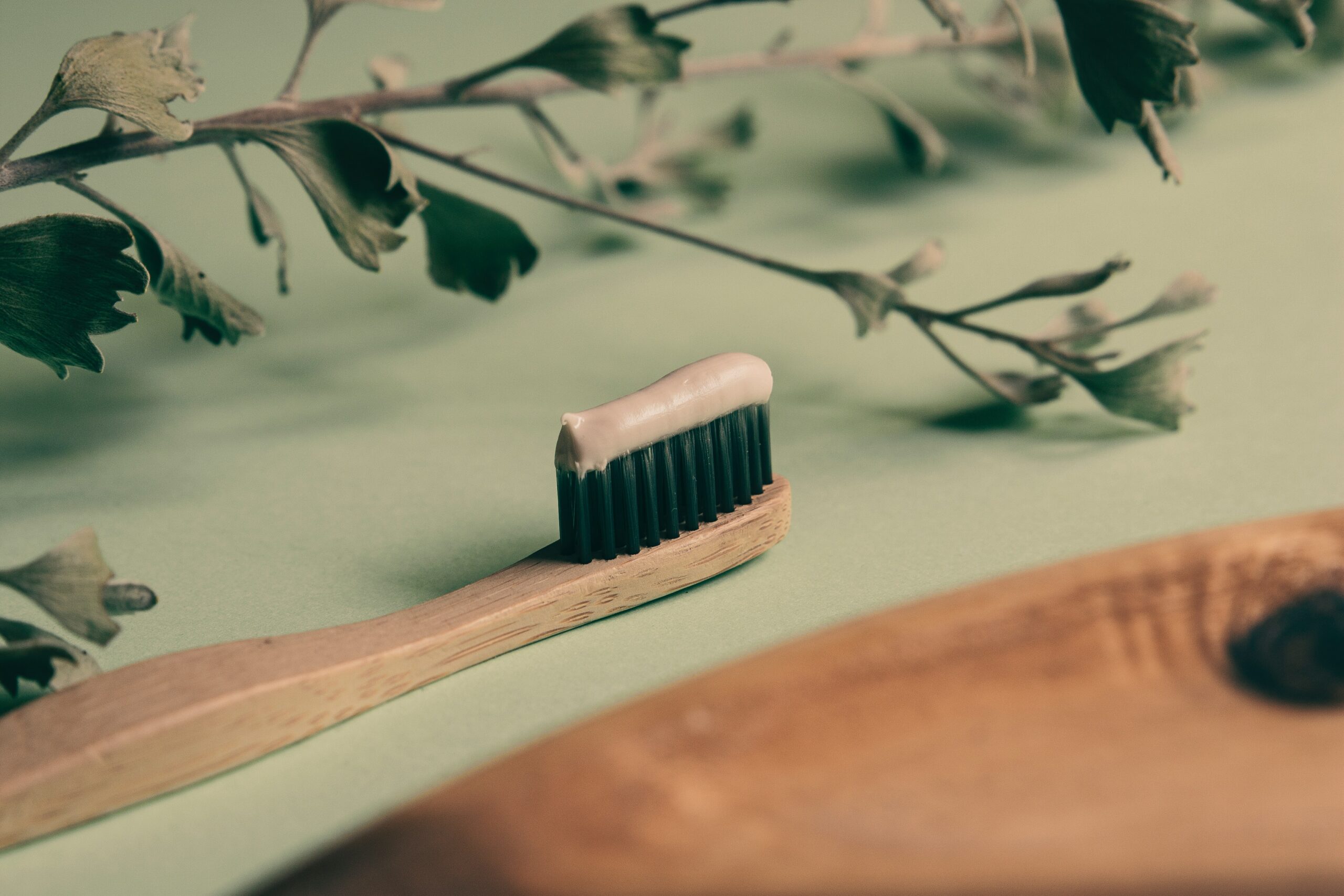
- Plaque surrounding the teeth and gums provides a breeding ground for germs. Gingivitis may develop if the germs are not eradicated(1).
- Cannabinoids like CBD may be antibacterial against dental plaque bacteria(2). Researchers believe that cannabinoids like CBD may be a safer alternative to synthetic antibiotics.
- In an advanced stage of periodontitis (gum disease), inflammation can lead to loss of bone and teeth(3). Meanwhile, CBD possesses anti-inflammatory effects(4), which may enhance oral health and reduce mouth inflammation.
- Good oral health habits, like flossing daily, brushing at least twice a day, and making regular dental appointments, can help prevent gum disease like gingivitis(5). Oral care may reduce throat and mouth infections(6).
- CBD has antimicrobial potential(7). Therefore, CBD-infused in toothpaste may help with throat or oral infections.
How CBD Toothpaste May Help Promote Dental Health and Whiten Teeth
Plaque buildup around the teeth and gum line produces a breeding habitat for bacteria to grow. Failure to eradicate the bacteria may cause oral diseases such as gingivitis(8).
A mild type of periodontal(gum) disease, gingivitis affects the gums around teeth, causing redness and swelling of the gingiva(9). Signs of gingivitis include inflamed gums that bleed when brushing or flossing, having bad breath, and receding gums(10).
In an advanced stage of gum disease called periodontitis, inflammation can lead to loss of teeth and bone(11). Meanwhile, studies show that CBD has anti-inflammatory characteristics(12). Hence, CBD-infused toothpaste may help promote dental health.
Cannabidiol, often known as CBD, is a naturally occurring substance in the cannabis Sativa plant. It is extracted from Cannabaceae plants, which are members of the hemp family(13). The THC content of the hemp plant is below the legal limit of 0.3%. CBD, unlike THC, has no psychoactive properties.
Research suggests that nonpsychoactive cannabinoid has some potential as an analgesic and anti-inflammatory agent(14).
CBD and Dental Health
The use of CBD in dentistry has not been studied well, and its impact on managing oral diseases remains unknown.
Still, considering CBD’s properties, researchers believe that the nonpsychoactive compound results in positive therapeutic effects on specific diseases like oral mucositis (OM)(15).
OM is characterized by tissue swelling, soreness, or pain in the mouth or throat(16).
Individuals with OM generally feel oral pain as a typical symptom. Oral pain makes it difficult or almost impossible to eat, leading to malnutrition in some cases(17).
Meanwhile, according to a study published in the International Journal of Molecular Sciences, cannabinoids like CBD may induce analgesic and anti-inflammatory effects(18).
Research also suggests the antibiotic potential for cannabis molecules(19). Data show that CBD, the most common cannabinoid in the cannabis plant, has antiseptic and antibacterial properties.
The studies mentioned above may support the health benefits of CBD in managing the development of bacteria that may cause oral problems.
The Science Behind Using CBD Toothpaste
CBD binds to cannabinoid receptors 1 and 2 (CB1 and CB2) found in humans’ and animals’ endocannabinoid systems (ECS)(20). These receptors are crucial in pain and inflammatory pathophysiology.
The ECS is responsible for preserving the body’s equilibrium or homeostasis. Through cannabinoid receptors(21), the ECS manages pain and modulates inflammatory signals(22).
The typical sign of oral illness is swollen and bleeding gums. CBD may be able to alleviate these symptoms by interacting with CB2 cannabinoid receptors.
CBD has anti-inflammatory and analgesic properties(23). Thus, CBD toothpaste may relieve chronic gum discomfort.
Benefits of Using CBD Oral Care: Why Use CBD Toothpaste?
CBD, in general, may be utilized to treat dental plaque-associated bacteria. Synthetic antibiotics have a safer alternative to cannabinoids like CBD(24).
Using triclosan-formulated toothpaste and mouthwash with antibacterial properties may kill harmful bacteria and improve oral health(25).
The FDA reviewed the effectiveness of triclosan in a consumer product toothpaste. The agency found that the substance prevented gingivitis(26).
Although some agents are known to be effective against certain bacteria, they are not always effective against all types of bacteria(27).
For instance, Streptococcus mutans usually cause tooth decay. Dental caries or tooth decay is strongly associated with S. mutans, typically present in humans’ dental plaque(28).
S. mutans, a member of the viridans genus, is found in the mouth and is associated with tooth decay(29).
No factual data demonstrate a link between CBD toothpaste and oral care. However, studies suggest that CBD possesses antibacterial properties(30).
According to a study, antimicrobial agents have been used as chemotherapeutic agents(31). Thus, CBD-infused toothpaste may be used as a natural way to promote healthy teeth and gums due to its antibacterial properties.
Meanwhile, acids are produced when sugars are broken down by the oral bacteria(32). An acidic environment can remineralize the teeth(dissolution of tooth minerals)(33).
It is essential to maintain a neutral pH to prevent the dissolution of tooth minerals.The potential of hydrogen (pH) is a quantitative measure of the acidity of liquid solutions. With CBD’s antibacterial properties(34), a pH-balanced mouth may stay balanced.
Using CBD toothpaste that maintains a pH balance and includes only pure components such as organic xylitol, essential oils, and vitamins may help with dental problems.
What Is Inside CBD Toothpaste?
CBD hemp-oil toothpaste manufacturers strive to deliver dentist-formulated products with the highest quality components. Manufacturers claim CBD promotes dental health and may be used for teeth whitening.
According to studies, CBD has antimicrobial qualities(35). Thus, CBD-infused toothpaste may be used to support healthy teeth and gums.
CBD toothpaste brands ensure that every component of CBD toothpaste is carefully chosen for its specific function to provide the finest CBD toothpaste.
CBD in toothpaste and mouthwash is available on the market to supposedly help prevent cavities and gum diseases. However, consumers have to be cautious when purchasing CBD products for their overall health protection when buying oral care products.
What Is Not Inside CBD Toothpaste?
What is not inside is equally as essential as what is inside for dental care and wellness.
According to the American Dental Association, conventional toothpaste includes flavoring agents that may potentially damage oral health(36).
For instance, SLS (sodium lauryl sulfate) is a foaming chemical present in conventional toothpaste. SLS is used to create a foaming effect in toothpaste(37).
SLS can interact with the formation of fluoride on the dental enamel. Researchers believe that this interaction may decrease the cariostatic effect, preventing the formation of dental cavities caused by fluorides(38).
CBD toothpaste that contains the highest quality components usually does not contain(39):
- Detergents
- Flavor
- Abrasive
- Humectants
- Preservatives
Importance of Having Healthy Teeth and Gums
Research published in the Journal of the American Heart Association noted that germs usually present in the mouth were discovered in stroke survivors’ brains and may pose risks of stroke and heart attack(40).
Meanwhile, research published suggests a strong correlation between tooth loss and carotid artery plaque prevalence(41). The carotid artery plaque prevalence was about 60% among those with at least ten missing teeth. If left untreated, gum disease can lead to tooth loss(42).
The buildup of plaque on the teeth can eventually lead to cavities. These cavities then allow bacteria to access the deeper layers of the tooth(43).
Great oral health is a good starting point for good overall health. Brushing and flossing can help keep plaque from building up(44). However, not all toothpaste is the same, and not all toothpaste works the same way.
What Is CBD?
The most significant cannabis components are cannabinoids generated by terpene. The most significant psychoactive component is tetrahydrocannabinol (TCH), especially the isomer delta (9-THC)(45).
Other known compounds found in the cannabis plant include cannabidiol or CBD.
Unlike 9-THC, cannabidiol is nonintoxicating(46). CBD has various beneficial effects, such as reducing inflammation(47) and treating pain(48). It also has analgesic properties(49).
CBD Products
Various CBD extracts are available, such as full-spectrum CBD, broad-spectrum CBD, and CBD isolates.
Full-spectrum CBD oil includes all cannabinoids, essential oils, terpenes (essential oils’ constituents), and flavonoids found in the cannabis plant.
Flavonoids are antiviral, antioxidant, and anti-inflammatory active compounds(50).
The THC content in full-spectrum CBD oil is less than 0.3%. The “entourage effect” may also be attributed to this CBD extract since it contains all cannabinoids found in the cannabis plant. The “entourage effect” refers to the beneficial impact gained from adding terpenes to cannabinoids.
A full-spectrum CBD product comprises essential oils, terpenes, and additional cannabinoids, including cannabinol.
Broad-spectrum, on the other hand, is THC-free. Lastly, isolates are the pure form of CBD.
CBD forms are available on the market, including CBD oil, tinctures, edibles like gummies, and vapes.
CBD Side Effects
CBD products may result in mild to significant adverse effects of CBD. While CBD may help with extreme fatigue symptoms, it may also induce adverse effects such as dry mouth, nausea, and headaches(51).
Individuals should consult a healthcare professional before taking CBD products to address medical conditions.
Legality
The FDA currently does not approve marketing applications for the use of derivatives from marijuana(52).
However, the 2018 Farm Bill removed the classification of industrial hemp as a controlled substance. The law also prohibited using derivatives of cannabis that contain less than 0.3 % THC(53).
- Gingivitis
https://www.mayoclinic.org/diseases-conditions/gingivitis/symptoms-causes/syc-20354453 - Comparison of Efficacy of Cannabinoids versus Commercial Oral Care Products in Reducing Bacterial Content from Dental Plaque: A Preliminary Observation
https://www.ncbi.nlm.nih.gov/pmc/articles/PMC6991146/ - Immune culprits linked to inflammation and bone loss in gum disease
https://www.nih.gov/news-events/nih-research-matters/immune-culprits-linked-inflammation-bone-loss-gum-disease - Antioxidative and Anti-Inflammatory Properties of Cannabidiol
https://www.ncbi.nlm.nih.gov/labs/pmc/articles/PMC7023045/ - Gingivitis
https://www.mayoclinic.org/diseases-conditions/gingivitis/symptoms-causes/syc-20354453# - Oral Care to Reduce Mouth and Throat Infections in Critically Ill Patients
https://clinicaltrials.gov/ct2/show/NCT00078663 - The antimicrobial potential of cannabidiol
https://www.nature.com/articles/s42003-020-01530-y - Gingivitis
https://www.mayoclinic.org/diseases-conditions/gingivitis/symptoms-causes/syc-20354453# - Ibid.
- Ibid.
- Immune culprits linked to inflammation and bone loss in gum disease
https://www.nih.gov/news-events/nih-research-matters/immune-culprits-linked-inflammation-bone-loss-gum-disease - Antioxidative and Anti-Inflammatory Properties of Cannabidiol
https://www.ncbi.nlm.nih.gov/labs/pmc/articles/PMC7023045/ - Ibid.
- Antioxidative and Anti-Inflammatory Properties of Cannabidiol
https://www.ncbi.nlm.nih.gov/labs/pmc/articles/PMC7023045/#:~:text=Therefore%2C%20it%20has%20been%20suggested,of%20immune%20cells%20%5B66%5D. - Cannabidiol: an alternative therapeutic agent for oral mucositis?
https://onlinelibrary.wiley.com/doi/full/10.1111/jcpt.12504 - Oral mucositis – self-care
https://medlineplus.gov/ency/patientinstructions/000047.htm#:~:text=Oral%20mucositis%20is%20tissue%20swelling,to%20care%20for%20your%20mouth. - Cannabidiol: an alternative therapeutic agent for oral mucositis?
https://onlinelibrary.wiley.com/doi/full/10.1111/jcpt.12504 - Cannabidiol for Pain Treatment: Focus on Pharmacology and Mechanism of Action
https://www.ncbi.nlm.nih.gov/pmc/articles/PMC7700528/ - Research establishes antibiotic potential for cannabis molecule
https://www.uq.edu.au/news/article/2021/01/research-establishes-antibiotic-potential-cannabis-molecule - Cannabinoid Receptors and the Endocannabinoid System: Signaling and Function in the Central Nervous System
https://www.ncbi.nlm.nih.gov/labs/pmc/articles/PMC5877694/ - The Endocannabinoid System, Our Universal Regulator
https://www.jyi.org/2018-june/2018/6/1/the-endocannabinoid-system-our-universal-regulator - Cannabinoid Receptors and the Endocannabinoid System: Signaling and Function in the Central Nervous System
https://www.ncbi.nlm.nih.gov/labs/pmc/articles/PMC5877694/ - Antioxidative and Anti-Inflammatory Properties of Cannabidiol
https://www.ncbi.nlm.nih.gov/labs/pmc/articles/PMC7023045/ - Comparison of Efficacy of Cannabinoids versus Commercial Oral Care Products in Reducing Bacterial Content from Dental Plaque: A Preliminary Observation
https://www.ncbi.nlm.nih.gov/pmc/articles/PMC6991146/ - Antimicrobial Efficacy of Different Toothpastes and Mouthrinses: An In Vitro Study
https://www.ncbi.nlm.nih.gov/labs/pmc/articles/PMC3177399/ - 5 Things to Know About Triclosan
https://www.fda.gov/consumers/consumer-updates/5-things-know-about-triclosan - Germs: Understand and protect against bacteria, viruses, and infections
https://www.mayoclinic.org/diseases-conditions/infectious-diseases/in-depth/germs/art-20045289 - Streptococcus mutans
https://www.sciencedirect.com/topics/medicine-and-dentistry/streptococcus-mutans - Streptococcus bacterium genus
https://www.britannica.com/science/Streptococcus-mutans - The antimicrobial potential of cannabidiol
https://www.nature.com/articles/s42003-020-01530-y - Antimicrobial Efficacy of Different Toothpastes and Mouthrinses: An In Vitro Study
https://www.ncbi.nlm.nih.gov/pmc/articles/PMC3177399/ - Chapter 99Microbiology of Dental Decay and Periodontal Disease
https://www.ncbi.nlm.nih.gov/books/NBK8259/ - Demineralization–remineralization dynamics in teeth and bone
https://www.ncbi.nlm.nih.gov/pmc/articles/PMC5034904/ - Cannabinoids versus Commercial Oral Care Products in Reducing Bacterial Content from Dental Plaque: A Preliminary Observation
https://www.ncbi.nlm.nih.gov/pmc/articles/PMC6991146/ - The antimicrobial potential of cannabidiol
https://www.nature.com/articles/s42003-020-01530-y - Toothpastes
https://www.ada.org/resources/research/science-and-research-institute/oral-health-topics/toothpastes - [Should toothpastes foam? Sodium lauryl sulfate–a toothpaste detergent in focus] https://pubmed.ncbi.nlm.nih.gov/2696932/
- Ibid.
- Contents of toothpaste – safety implications
https://www.nps.org.au/australian-prescriber/articles/contents-of-toothpaste-safety-implications - Oral Bacterial Signatures in Cerebral Thrombi of Patients With Acute Ischemic Stroke Treated With Thrombectomy
https://www.ahajournals.org/doi/10.1161/JAHA.119.012330 - Relationship Between Periodontal Disease, Tooth Loss, and Carotid Artery Plaque: The Oral Infections and Vascular Disease Epidemiology Study (INVEST)
https://www.ncbi.nlm.nih.gov/labs/pmc/articles/PMC2677013/ - Periodontis
https://www.mayoclinic.org/diseases-conditions/periodontitis/symptoms-causes/syc-20354473 - Cavities/tooth decay
https://www.mayoclinic.org/diseases-conditions/cavities/symptoms-causes/syc-20352892 - Dental Plaque
https://my.clevelandclinic.org/health/diseases/10953-plaque# - Cannabidiol (CBD)
https://www.ncbi.nlm.nih.gov/books/NBK556048/ - The Effects of Cannabidiol, a Non-Intoxicating Compound of Cannabis, on the Cardiovascular System in Health and Disease
https://www.ncbi.nlm.nih.gov/labs/pmc/articles/PMC7554803/ - Antioxidative and Anti-Inflammatory Properties of Cannabidiol
https://www.ncbi.nlm.nih.gov/labs/pmc/articles/PMC7023045/ - Cannabinoids in the management of difficult to treat pain
https://www.ncbi.nlm.nih.gov/labs/pmc/articles/PMC2503660/ - Antioxidative and Anti-Inflammatory Properties of Cannabidiol
https://www.ncbi.nlm.nih.gov/labs/pmc/articles/PMC7023045/ - Flavonoids as antioxidants
https://pubmed.ncbi.nlm.nih.gov/10924197/ - What are the benefits of CBD — and is it safe to use?
https://www.mayoclinic.org/healthy-lifestyle/consumer-health/expert-answers/is-cbd-safe-and-effective/faq-20446700 - FDA Regulation of Cannabis and Cannabis-Derived Products, Including Cannabidiol (CBD)
https://www.fda.gov/news-events/public-health-focus/fda-regulation-cannabis-and-cannabis-derived-products-including-cannabidiol-cbd - Hemp Production and the 2018 Farm Bil
https://www.fda.gov/news-events/congressional-testimony/hemp-production-and-2018-farm-bill-07252019












